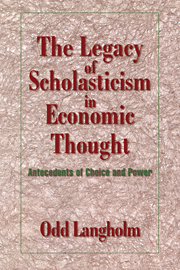Book contents
- Frontmatter
- Contents
- Preface
- Introduction
- I COMPULSION AND THE WILL: THREE ANCIENT TRADITIONS
- II NEED AS COMPULSION: THE SCHOLASTIC PARADIGM
- III REJECTION AND REVIVAL IN POSTSCHOLASTIC THOUGHT
- 8 Hobbes: the antithesis
- 9 The economics of natural law
- 10 The neoclassical system and its critics
- Bibliography
- Index
8 - Hobbes: the antithesis
Published online by Cambridge University Press: 13 March 2010
- Frontmatter
- Contents
- Preface
- Introduction
- I COMPULSION AND THE WILL: THREE ANCIENT TRADITIONS
- II NEED AS COMPULSION: THE SCHOLASTIC PARADIGM
- III REJECTION AND REVIVAL IN POSTSCHOLASTIC THOUGHT
- 8 Hobbes: the antithesis
- 9 The economics of natural law
- 10 The neoclassical system and its critics
- Bibliography
- Index
Summary
Hobbes against “School-divinity”
The concluding pages of each of the chapters of Part II of this book demonstrate a common tendency of decline of a certain set of doctrines concerning need, the will, and justice, which lie at the core of what may be called scholastic economic ethics. After having been applied for different lengths of time to questions regarding capital, commodities, and labor, these doctrines started to lose ground in each of the three areas in the first half of the sixteenth century and continued to do so until we closed the record some hundred years later. This was a period of increasing secularization of intellectual life and of nascent capitalism. New ideas about economics, based on altered material and institutional and religious premises, found expression in other literary media than those examined in Part II; however, the late scholastics' growing doubts about the validity of traditional doctrines also herald these new developments. It is the purpose of Part III to trace them further, with special reference to the question of choice and compulsion or (as it is now mostly called) coercion in economic relationships. As told in broad outline in Chapters 9 and 10, this is a story of virtually complete rejection of the medieval paradigm in academic and political circles, followed, after centuries, by its reappearance, in different shapes, partly without any acknowledgment of a scholastic heritage. Before embarking on that general historical survey, I propose, in the present chapter, to establish a point of observation and departure in the works of the seventeenth-century philosopher whose position on these issues is absolutely unique, namely, Thomas Hobbes.
- Type
- Chapter
- Information
- The Legacy of Scholasticism in Economic ThoughtAntecedents of Choice and Power, pp. 139 - 157Publisher: Cambridge University PressPrint publication year: 1998

